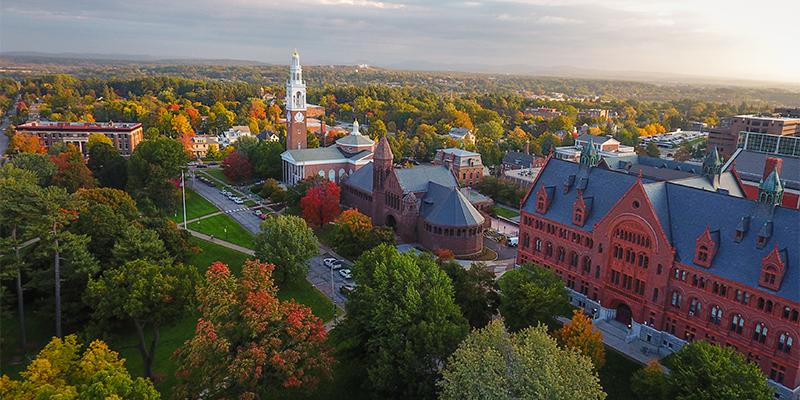The University of Vermont (UVM) has joined a United Nations initiative that brings together international sustainability experts to solve urgent global challenges.
The Sustainable Development Solutions Network (SDSN) seeks to achieve the Paris Climate Agreement and the U.N. Sustainable Development Goals—a global effort to address poverty, protect the environment, grow the economy, and promote peace and good governance. The network is led by U.N. Secretary-General and acclaimed economist Jeffrey Sachs.
“UVM has longstanding leadership in the areas of healthy societies and a healthy environment,” says UVM President Suresh Garimella. “As we advance these priorities through the Amplifying Our Impact strategic vision—and grow the areas of inquiry that connect them—I look forward to extending our contributions on a global scale. This partnership will not only further that work, it will promote UVM’s sustainability profile and create new opportunities for our scholars to develop solutions for the people of Vermont, the U.S. and world.”
The SDSN spans six continents and draws upon the knowledge and educational capacity of over 1,200 member institutions.
UVM’s SDSN liaison is Taylor Ricketts, Director of the Gund Institute for Environment, a UVM-wide accelerator of environmental research, which connects discoveries and new knowledge to government, business and society.
“I am excited that UVM is part of this global community of leaders, scholars, and practitioners focused on sustainability solutions,” says Taylor Ricketts. “Research at UVM and the Gund Institute research advances many Sustainable Development Goals. This connects UVM scholars to global priorities, and increases opportunities for real-world impact.”
The new partnership includes access for UVM scholars and Gund Fellows to SDSN Mobilize, a global platform that connects members to share and discover research and funding opportunities, find collaborators, develop partnerships, submit questions, and promote events related to sustainable development.
UVM’s leadership in sustainability
UVM has been a sustainability leader in American higher education since 1972, when it launched the nation’s first cross-college program in environmental studies. Inspired by our students’ passion for sustainability and the global climate crisis, UVM is a leader in sustainability education, research and operations.
- In 2020, UVM announced a rapid divestment of fossil fuel investments from its endowment by 2023.
- UVM scholars publish in leading scientific journals, attract international media attention, and are recognized by national academic societies, including the American Association for the Advancement of Science (AAAS) and the Ecological Society of America (ESA).
- 100% of UVM undergrads take sustainability courses, while 62% of departments conduct research related to the UN Sustainable Development Goals.
- UVM has earned Gold ratings by STARS, the Sustainability Tracking, Assessment & Rating System in three successive reports (2014, 2017, and 2020).
- The Grossman Sustainable Innovation MBA (SI-MBA) program is ranked the #1 Green MBA program by Princeton Review.
- The Gund Institute for Environment launched in 2017 to accelerate transdisciplinary environmental research at UVM; connect the University with leaders in government, business, and society; and develop real-world solutions to urgent global issues.
- In 2013, UVM was among the first public universities in the country to end bottled water sales in response to student advocacy.
- In 2007, UVM became a charter member of American College & University Presidents’ Climate Commitment—now the Carbon Commitment—to address climate change by reducing campus emissions and accelerating research and education.
- In 2007, UVM created the Clean Energy Fund (now the Sustainable Campus Fund) in response to student interest. The fund has invested over $1.5M on 40+ education, research, and campus renewable energy projects. UVM was among the first institutions in the country to create a substantial fund of this kind.
- UVM offers many sustainability-focused bachelor’s and graduate degrees, programs, and certificates. UVM is the first and only university in the country to offer undergraduate, master’s, and doctoral degrees in Food Systems. Forty-five percent of UVM’s continuing education courses are sustainability-related and include a Campus Sustainability Leadership Professional Certificate, drawing sustainability professionals from across the country to access UVM’s best practices.
- In 1973, UVM created the School of Natural Resources, which became the Rubenstein School of Environment and Natural Resources in 2003.
- In 1972, UVM launched the first U.S. cross-college environmental studies program.
Learn more about UVM’s leadership in sustainability.
